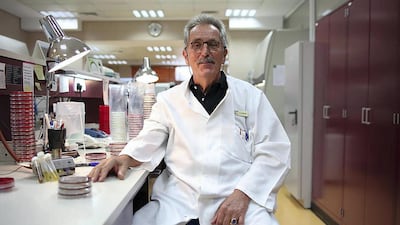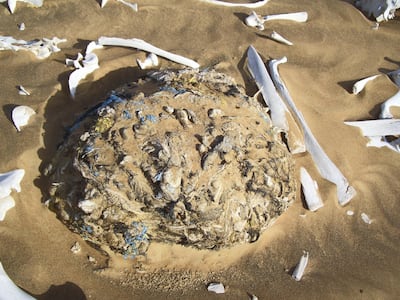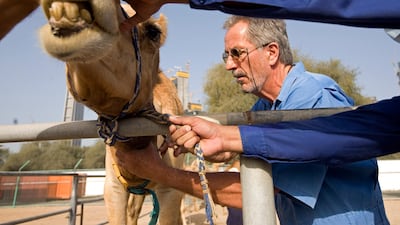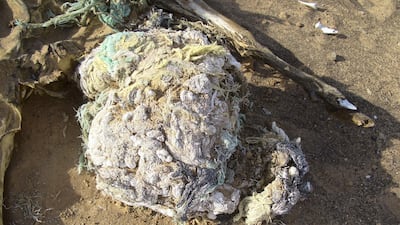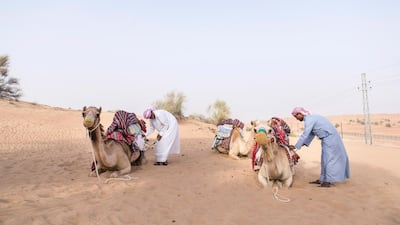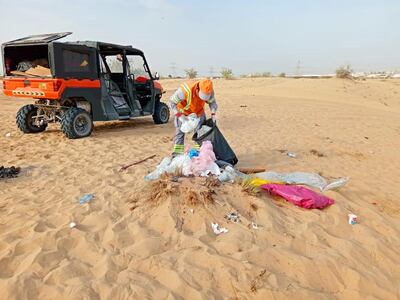Hundreds of camels across the UAE have died because of plastic consumption over the past decade, a study has shown.
Of 30,000 camels analysed since 2008, in the field or in a laboratory by staff from Dubai’s Central Veterinary Research Laboratory, about 300 died because of polybezoars – lumps of indigestible material made of plastic.
That translates to about one in 100 camel deaths in the UAE due to the consumption of plastic waste left behind by humans either camping or generally littering.
The study, entitled The Plight of Camels Eating Plastic Waste, was recently published in the Journal of Arid Environments. It said polybezoars found in camel stomachs can weigh up to 53kg or as much as some people.
You cannot just say 'please don't litter'. You have to punish them. They will stop when they feel it in their pocket
As well as plastic bags, polybezoars also often contain rope and parts of plastic bottles, including caps, which accumulate over years when the animals eat them in the mistaken belief they are food.
Excessive consumption of non-degradable waste can mean a drawn out and agonising death for camels.
“For me, as a veterinarian, to see all this suffering of animals, it’s just devastating,” said Dr Ulrich Wernery, the CVRL’s scientific director and an author of the paper.
“If you go through the desert you find plastic everywhere. People don’t care; they throw their stuff out of their car and it flies everywhere.”
The first author of the study, Dr Marcus Eriksen, the US-based co-founder and research director of a plastic pollution campaigning organisation, the 5 Gyres Institute, saw first-hand how the problem of plastic waste in the Gulf has increased.
A former Marine, who fought in the first Gulf War three decades ago, Dr Eriksen was taken to the desert near Dubai by Dr Wernery and said there was far more debris now than when he was first in the region.
“What I saw was devastating,” he said. “I couldn’t believe how much trash, 30 years later, was blowing across the desert.”
In the desert, Dr Wernery showed him camel skeletons with polybezoars visible inside the ribs. These huge lumps of plastic waste had clearly caused the animals’ death.
Polybezoars kill in different ways. They create what Dr Eriksen described as “extremely painful” blockages that may prove fatal, and also cause the number of bacteria inside the camels to spike, resulting in deadly infections.
By filling up the stomach, and discouraging eating, they lead to starvation because few nutrients are absorbed. The animals are likely to suffer “incessant pain”.
“It could take months or years to accumulate to the point where it becomes a detrimental effect,” Dr Eriksen said.
“It goes from discomfort to detriment … The animal slowly dies. All that time they’re suffering.”
A key problem, said Dr Eriksen, is that plastic bags are often caught by the wind and blown across the desert even if initially disposed of properly.
As a result, the authors of the study suggested that, “careful consideration be placed on the role of single-use plastics, their current use and eventual elimination from modern societies.”
A compulsory levy on plastic bags could help to reduce their use, said Dr Eriksen. Such a measure would mirror compulsory charges introduced in many other countries.
According to UK government figures, large supermarkets in England gave out 7.6 billion single-use plastic bags in 2014, the year before a 5p (Dh0.24) compulsory levy was introduced. The charge reduced the number of plastic bags used by more than four fifths.
The researchers also suggest consideration be given to a ban on single-use plastics, along with tougher fines for people who discard plastic bags.
“You cannot just talk to people and say, ‘Please don’t litter’. They don’t listen to you. You have to punish them,” said Dr Wernery.
“They will stop when they feel it in their pocket.”
Campers must clean up after themselves
Environmentalists and veterinarians have urged anyone heading to the desert to carefully dispose of their waste to prevent further damage to the UAE's wildlife and natural environment.
Camping in the desert, mountains or near the beach is very common among residents and Emiratis, particularly during the cooler winter months, but leaving waste behind can contribute to an agonising death to many animals, birds and marine life.
Last week, Dubai Municipality removed 130 tonnes of rubbish from a desert and six-week clean-up campaign is currently under way to rid the emirate's desert of more waste.
“I have been here for 20 years now and saw many dead animals with plastic in their stomach almost every second day,” Dr Wernery said.
“It is a worldwide problem and people should be aware and always reminded about the consequences of leaving litter behind."
Most recently, Dr Werney found a decomposed cow in Al Wathba with 26kg of plastic in its stomach.
“I've dealt with dead animals such as camels, cows, gazelles, goats, birds, turtles and sea mammals here and it's only the tip of the iceberg,” he said.
Dr Mansoor Chaudhry, head of Clinical Department at Dubai Camel Hospital, said people needed to take responsibility for protecting the country's environment.
“The desert is a place of nature, sustainable environment, natural herb growth, living and grazing wild animals. It needs attention and care from all community members using it for camping, site seeing, family gathering and safari.
“Though there are strict rules from the UAE government to keep the desert and beaches clean, additional efforts, information, education and guidelines are required at different levels for campers, tourist and the general public.”
Dr Chaudhry said there would likely be more camel deaths due to plastic ingestion if the animals were not typically cordoned off in designated areas.
“But some dead camels were found having gastrolith on postmortem examinations, which probably were due to ignorance and carelessness while feeding the camels in stables, eating in open rubbish bins or grazing in the desert unattended,” he said.
Habiba Al Marashi, chairwoman of Emirates Environmental Group, said that most people underestimate the importance of a healthy desert ecosystem.
“A wide range of important minerals, such as gypsum, are formed in the deserts. The UAE deserts are also home to many rare species that are close to being endangered."
She said recommended that camping be regulated by stricter rules to ensure people were not littering.
“It is recommended that the government steps in to dedicate only a few sites to individual campers and the rest to camp organisers so that maintaining clean deserts are easier,” Ms Habiba said.
“People must be encouraged to camp with arrangements made by agencies.”
Emirates Environmental Group carries out regular clean-up campaigns across the country. Last year, the group cleared 43.3 tonnes of waste from the desert and are hoping to clean up more this year.
KILLING OF QASSEM SULEIMANI
More from Neighbourhood Watch:
Zayed Sustainability Prize
Results
5pm Maiden (PA) Dh80,000 1,400m
Winner No Riesgo Al Maury, Szczepan Mazur (jockey), Ibrahim Al Hadhrami (trainer)
5.30pm Handicap (PA) Dh80,000 1,600m
Winner Marwa W’Rsan, Sam Hitchcott, Jaci Wickham.
6pm Handicap (PA) Dh80,000 1,600m
Winner Dahess D’Arabie, Al Moatasem Al Balushi, Helal Al Alawi.
6.30pm Handicap (PA) Dh80,000 2,200m
Winner Safin Al Reef, Connor Beasley, Abdallah Al Hammadi.
7pm Wathba Stallions Cup Handicap (PA) Dh70,000 2,200m
Winner Thulbaseera Al Jasra, Shakir Al Balushi, Ibrahim Al Hadhrami.
7.30pm Maiden (TB) Dh 80,000 2,200m
Winner Autumn Pride, Szczepan Mazur, Helal Al Alawi.
More from Neighbourhood Watch:
Fight card
Preliminaries:
Nouredine Samir (UAE) v Sheroz Kholmirzav (UZB); Lucas Porst (SWE) v Ellis Barboza (GBR); Mouhmad Amine Alharar (MAR) v Mohammed Mardi (UAE); Ibrahim Bilal (UAE) v Spyro Besiri (GRE); Aslamjan Ortikov (UZB) v Joshua Ridgwell (GBR)
Main card:
Carlos Prates (BRA) v Dmitry Valent (BLR); Bobirjon Tagiev (UZB) v Valentin Thibaut (FRA); Arthur Meyer (FRA) v Hicham Moujtahid (BEL); Ines Es Salehy (BEL) v Myriame Djedidi (FRA); Craig Coakley (IRE) v Deniz Demirkapu (TUR); Artem Avanesov (ARM) v Badreddine Attif (MAR); Abdulvosid Buranov (RUS) v Akram Hamidi (FRA)
Title card:
Intercontinental Lightweight: Ilyass Habibali (UAE) v Angel Marquez (ESP)
Intercontinental Middleweight: Amine El Moatassime (UAE) v Francesco Iadanza (ITA)
Asian Featherweight: Zakaria El Jamari (UAE) v Phillip Delarmino (PHI)
KILLING OF QASSEM SULEIMANI
More on Quran memorisation:
COMPANY PROFILE
Company name: SimpliFi
Started: August 2021
Founder: Ali Sattar
Based: UAE
Industry: Finance, technology
Investors: 4DX, Rally Cap, Raed, Global Founders, Sukna and individuals
RESULTS
6.30pm Handicap (TB) $68,000 (Dirt) 1,200m
Winner Canvassed, Par Dobbs (jockey), Doug Watson (trainer)
7.05pm Meydan Cup – Listed Handicap (TB) $88,000 (Turf) 2,810m
Winner Dubai Future, Frankie Dettori, Saeed bin Suroor
7.40pm UAE 2000 Guineas – Group 3 (TB) $125,000 (D) 1,600m
Winner Mouheeb, Ryan Curatolo, Nicholas Bachalard
8.15pm Firebreak Stakes – Group 3 (TB) $130,000 (D) 1,600m
Winner Secret Ambition, Tadhg O’Shea, Satish Seemar
9.50pm Meydan Classic – Conditions (TB) $$50,000 (T) 1,400m
Winner Topper Bill, Richard Mullen, Satish Seemar
9.25pm Dubai Sprint – Listed Handicap (TB) $88,000 (T) 1,200m
Winner Man Of Promise, William Buick, Charlie Appleby
UAE currency: the story behind the money in your pockets
Killing of Qassem Suleimani
Banned items
Dubai Police has also issued a list of banned items at the ground on Sunday. These include:
-
-
-
-
-
-
-
-
-
Political flags or banners
-
Bikes, skateboards or scooters
Mohammed bin Zayed Majlis
Mohammed bin Zayed Majlis
More on animal trafficking
UAE currency: the story behind the money in your pockets
Killing of Qassem Suleimani
Killing of Qassem Suleimani
The National's picks
4.35pm: Tilal Al Khalediah
5.10pm: Continous
5.45pm: Raging Torrent
6.20pm: West Acre
7pm: Flood Zone
7.40pm: Straight No Chaser
8.15pm: Romantic Warrior
8.50pm: Calandogan
9.30pm: Forever Young
Zayed Sustainability Prize
Match info
Deccan Gladiators 87-8
Asif Khan 25, Dwayne Bravo 2-16
Maratha Arabians 89-2
Chadwick Walton 51 not out
Arabians won the final by eight wickets
Mohammed bin Zayed Majlis
More coverage from the Future Forum
The years Ramadan fell in May
UAE currency: the story behind the money in your pockets
Key facilities
- Olympic-size swimming pool with a split bulkhead for multi-use configurations, including water polo and 50m/25m training lanes
- Premier League-standard football pitch
- 400m Olympic running track
- NBA-spec basketball court with auditorium
- 600-seat auditorium
- Spaces for historical and cultural exploration
- An elevated football field that doubles as a helipad
- Specialist robotics and science laboratories
- AR and VR-enabled learning centres
- Disruption Lab and Research Centre for developing entrepreneurial skills
Killing of Qassem Suleimani
More from Neighbourhood Watch:
COMPANY%20PROFILE%20
%3Cp%3E%3Cstrong%3EName%3A%3C%2Fstrong%3E%20Haltia.ai%0D%3Cbr%3E%3Cstrong%3EStarted%3A%3C%2Fstrong%3E%202023%0D%3Cbr%3E%3Cstrong%3ECo-founders%3A%3C%2Fstrong%3E%20Arto%20Bendiken%20and%20Talal%20Thabet%0D%3Cbr%3E%3Cstrong%3EBased%3A%3C%2Fstrong%3E%20Dubai%2C%20UAE%0D%3Cbr%3E%3Cstrong%3EIndustry%3A%3C%2Fstrong%3E%20AI%0D%3Cbr%3E%3Cstrong%3ENumber%20of%20employees%3A%3C%2Fstrong%3E%2041%0D%3Cbr%3E%3Cstrong%3EFunding%3A%3C%2Fstrong%3E%20About%20%241.7%20million%0D%3Cbr%3E%3Cstrong%3EInvestors%3A%3C%2Fstrong%3E%20Self%2C%20family%20and%20friends%26nbsp%3B%3C%2Fp%3E%0A
THE BIO
Favourite holiday destination: Whenever I have any free time I always go back to see my family in Caltra, Galway, it’s the only place I can properly relax.
Favourite film: The Way, starring Martin Sheen. It’s about the Camino de Santiago walk from France to Spain.
Personal motto: If something’s meant for you it won’t pass you by.
Can NRIs vote in the election?
Indians residing overseas cannot cast their ballot abroad
Non-resident Indians or NRIs can vote only by going to a polling booth in their home constituency
There are about 3.1 million NRIs living overseas
Indians have urged political parties to extend the right to vote to citizens residing overseas
A committee of the Election Commission of India approved of proxy voting for non-resident Indians
Proxy voting means that a person can authorise someone residing in the same polling booth area to cast a vote on his behalf.
This option is currently available for the armed forces, police and government officials posted outside India
A bill was passed in the lower house of India’s parliament or the Lok Sabha to extend proxy voting to non-resident Indians
However, this did not come before the upper house or Rajya Sabha and has lapsed
The issue of NRI voting draws a huge amount of interest in India and overseas
Over the past few months, Indians have received messages on mobile phones and on social media claiming that NRIs can cast their votes online
The Election Commission of India then clarified that NRIs could not vote online
The Election Commission lodged a complaint with the Delhi Police asking it to clamp down on the people spreading misinformation
The five pillars of Islam
Read more about the coronavirus
SPECS
%3Cp%3E%3Cstrong%3EEngine%3A%3C%2Fstrong%3E%201.5-litre%204-cylinder%3Cbr%3E%3Cstrong%3EPower%3A%3C%2Fstrong%3E%20101hp%3Cbr%3E%3Cstrong%3ETorque%3A%3C%2Fstrong%3E%20135Nm%3Cbr%3E%3Cstrong%3ETransmission%3C%2Fstrong%3E%3A%20Six-speed%20auto%3Cbr%3E%3Cstrong%3EPrice%3A%3C%2Fstrong%3E%20From%20Dh79%2C900%3Cbr%3E%3Cstrong%3EOn%20sale%3A%3C%2Fstrong%3E%20Now%3C%2Fp%3E%0A
The years Ramadan fell in May
Prophets of Rage
(Fantasy Records)
The Voice of Hind Rajab
Starring: Saja Kilani, Clara Khoury, Motaz Malhees
Director: Kaouther Ben Hania
Rating: 4/5
Mohammed bin Zayed Majlis
The five pillars of Islam
UAE currency: the story behind the money in your pockets
Killing of Qassem Suleimani
Global Fungi Facts
• Scientists estimate there could be as many as 3 million fungal species globally
• Only about 160,000 have been officially described leaving around 90% undiscovered
• Fungi account for roughly 90% of Earth's unknown biodiversity
• Forest fungi help tackle climate change, absorbing up to 36% of global fossil fuel emissions annually and storing around 5 billion tonnes of carbon in the planet's topsoil
More from our neighbourhood series:
Read more from Aya Iskandarani
Most sought after workplace benefits in the UAE
- Flexible work arrangements
- Pension support
- Mental well-being assistance
- Insurance coverage for optical, dental, alternative medicine, cancer screening
- Financial well-being incentives
Killing of Qassem Suleimani
Tearful appearance
Chancellor Rachel Reeves set markets on edge as she appeared visibly distraught in parliament on Wednesday.
Legislative setbacks for the government have blown a new hole in the budgetary calculations at a time when the deficit is stubbornly large and the economy is struggling to grow.
She appeared with Keir Starmer on Thursday and the pair embraced, but he had failed to give her his backing as she cried a day earlier.
A spokesman said her upset demeanour was due to a personal matter.
The years Ramadan fell in May
More on animal trafficking
